Support for EU membership: from euphoria to constant support
Slovenia's entry into the EU was the main goal of Slovenian foreign policy at that time, which was further advanced in the following years by adopting the euro (January 1, 2007), joining the Schengen area (December 21, 2007), and holding the EU presidency (first half of 2008), making Slovenia the first new member state to do so. In a public opinion survey in the autumn of 2007, 71 percent of Slovenians were convinced that Slovenia had gained from EU membership. On average in the EU, 58 percent believed that their country had gained from membership. Today, eight out of ten Slovenians believe that the country benefits from EU membership, still placing us above the EU average; 72 percent of people in all member states share this view.
A special opinion poll by the European Parliament six months before the elections showed that 70 percent of respondents believe that activities and decisions made at the EU level have an impact on their daily lives, with 80 percent of respondents in Slovenia acknowledging this influence. In light of the upcoming European elections in June 2024, the majority of Europeans (53 percent) wish for the European Parliament to have a more significant role, which is also the majority opinion in 21 member states. In Slovenia, 61 percent of those surveyed support a greater role for the European Parliament.
The common European currency, the euro, enjoys high support among the residents of the countries that use it. According to a Eurobarometer survey published in autumn 2023, 79 percent of respondents believe that the euro is good for the EU, and 69 percent believe it is good for their country. In Slovenia, these proportions are even higher, standing at 86 and 78 percent, respectively.
Eurobarometer is the polling instrument used by the European Commission, the European Parliament and other EU institutions and agencies to monitor regularly the state of public opinion in Europe on issues related to the European Union as well as attitudes on subjects of political or social nature. Eurobarometer provides quality and relevant data for experts in public opinion, researchers, media and the public.


